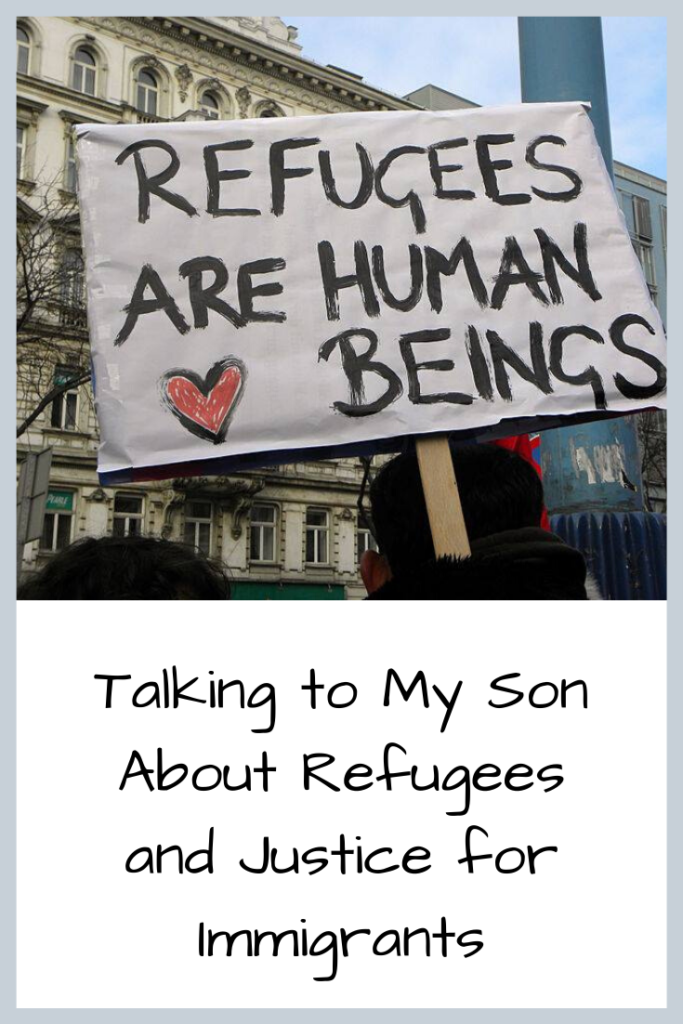
“What is it? Please tell me,” my six year old asked, his eyes wide.
“No, it’s too sad,” I replied. I had been telling my husband about news involving the Immigration and Customs Enforcement raids to deport undocumented immigrants. My speaking in veiled terms sparked my son’s interest. Telling him it was too sad for him only fueled his curiosity more.
“Pleeeease,” he begged, sitting down next to me on the stairs to the basement.
“Fine. So you know how people from other countries come to the U.S. because where they’re from is dangerous or just to have a better life?” He nodded. This was familiar territory. We talk regularly about how we know a lot of people who moved here from other countries, including several neighbors, friends, classmates, and fellow church-goers, as well as my aunt.
I continued. “Well, some people don’t have all of their paperwork when they come. And some people have paperwork that said they could stay for a while, but then they stayed for longer than that. Our government wants to send a lot of those people back to the countries they came from. Some of those people have lived here a long time or came over when they were really little and don’t really know anywhere else. I think that it’s wrong that the government is doing that. That’s why I’m sad.”
He thought for moment, half-frowning. Like most of these deep conversations, he didn’t have any questions. He needed time to process.
Then, his face lit up. “Want to hear a joke?”
“Are you telling me it to make me feel better because I’m sad?” I asked.
“Yep,” he said.
“Sure,” I responded, smiling.
“What do you need if you go to France?”
“What?”
“France ants! No, France ants in your pants!” He said. “No, what do you need if you go to Paris? France ants in your pants!”
Laughing, I said, “Go tell Daddy that one!”
While I hated having that conversation, I hate more that it’s a topic that’s still in the news. That it still needs to be in the news. Because our country continues to treat undocumented immigrants and people seeking refugee status horribly, I knew I would have to talk to my son about it at some point.
We personally know enough immigrants that there’s a very concrete aspect to it. I would never in a million years ask anyone about their status – it’s so not my business – but it’s certainly possible that people we know may be affected by these policies.
In addition, my husband and I talk about these issues a lot. It’s mentioned at church during our Prayers of the People and in sermons. If my son overhears these conversations, I want him to have a framework to understand it. I don’t want him to be needlessly afraid for our family, as I think some kids get where they hear about family separations. At the same time, while I purposefully didn’t make the connection to people we know, I wanted to lay the groundwork if we do need to help anyone out. Lastly, I want him to know that the people affected are real people, not just the threat that politicians – particularly our President – portray them as.
Beyond helping him understand issues right now, this conversation seemed necessary to set the foundation for future conversations. These things will continue to happen unless we name and talk about them. Sweeping these issues under the rug would be saying that these people don’t matter to us once the going gets tough. If there’s something I want to teach him, it’s that people matter the most when the going gets tough.
As he gets older, we’ll move from telling him about these issues to helping him speak out on them. I’ll teach him how to call his Congressperson, speak at Town Hall meetings, and attend protests. We’ll talk about how privileged we are and how that means we have an obligation to use that privilege to help others.
But here’s where we start. By answering questions honestly and age-appropriately, even and especially the hard ones.
For more on social justice and parenting, follow us on Facebook.